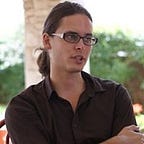To expand the moral circle, we need to shrink the extremism circle
Epistemic status: speculative pondering about how to expand the moral circle and fight extremism from four different directions — right, left, religion, organized crime .
We achieve progress in our history and civilization through expanding the moral circle. We could see the early signs of this in Abrahamic religions that substituted “scapegoats”, and stopped to sacrifice humans and started to sacrifice animals (then plants, things, tokens, abstract entities).
The expansion of a moral circle — from individuals, communities, cities, nations and towards a global village, or even beyond humans to animals — depends, in my opinion, on shrinking the “extremism circle” or “political circle” towards something we can call a rational centrism, effective centrism or what some would call radical centrism.
Four directions of extremism that can threaten liberal democracy
I expand here on the concept of Triple Threat to liberal democracy by Maajid Nawaz that he visualizes as a triangle — the extreme right, the extreme left and the religious extremists from above.
I added the fourth dimension of organized crime. This is still just a speculative outline, but we can visualize the center layer as individuals, then another layer of the circle as a collective, then yet another as state capture and the last circle as violence.
The first two layers are in tension but they are still within liberal democracy that creates a neutral and free space for exchange of ideas between individuals and various collectives or interest groups — religious, conservative, liberal, egalitarian or corporate.
I argue that this tension between individuals and collectives is healthy for the liberal democracy. We can imagine a pendulum that swings between these four directions and helps to promote a rational debate and air legitimate concerns. There might be individuals and collectives, that want to preserve the status quo, or might propose new paradigms or dissenting views.
To care universally and globally, we need to see everyone as a unique individual
But the liberal democracy is threatened when this debate gets “out of joint” and the pendulum swings to more extremes in these four directions: extreme right, extreme left, theocracy, organized crime.
This is the paradox — if we want to be truly universal and global in our moral considerations, we need to view people as unique individuals, and not as just uniform parts of collectives, or even adversaries that try to capture the state with their ideology.
Once things get more extreme, we might experience a state capture by a certain group and opposition from others — and this shatters the neutral and rational space for the debate.
The sense of a good measure is lost and people turn into enemies in a zero-sum conflict — one either wins or loses.
The passions can escalate even further into violence. Or can de-escalate again into a calmer and more liberal and democratic state of the first two circles: Individuals and Collectives. Where we can stop shouting and start talking again as fellow citizens.
We need both — individuals with bold visions and breakthrough technologies, but also collectives that can coordinate around important goals. But many complex systems require a sense of a good measure in ever changing contexts. And they require an evidence-based policy for that region and context.
For example, in some places a minimum wage might be too low, in others too high. In some periods, a world might be too globalized and open for its own good, in others too closed and protective and nationalistic for its own good.
As Peter Thiel explains, technology is very different from globalization. Technology is about radical breakthroughs — doing more with less — and “zero to one”. Globalization is about competition and copying and scaling — from “1 to n”.
A radical center policy (or an effective center policy, rational center policy?) is, or could be, about bringing new technologies and new paradigms and a healthy debate with opponents, but within liberal democracy, rule of law, and the first two circles — individuals and collectives. Once the circle is broken and the pendulum swings to ever more extreme ideological spaces — people become again tribalistic and acquire a zero-sum mindset.
This is the paradox — if we want to be truly universal and global in our moral considerations we need to view people as unique individuals and not as just uniform parts of collectives or even adversaries that try to capture the state with their ideology.
I failed to quickly create circles with titles, so I just visualized the four directions of extremism like this. Imagine a pendulum or circles in the water — if conflicts get more extreme and the pendulum swings too much, the liberal democracy is out of centre, and out-of-joint:
